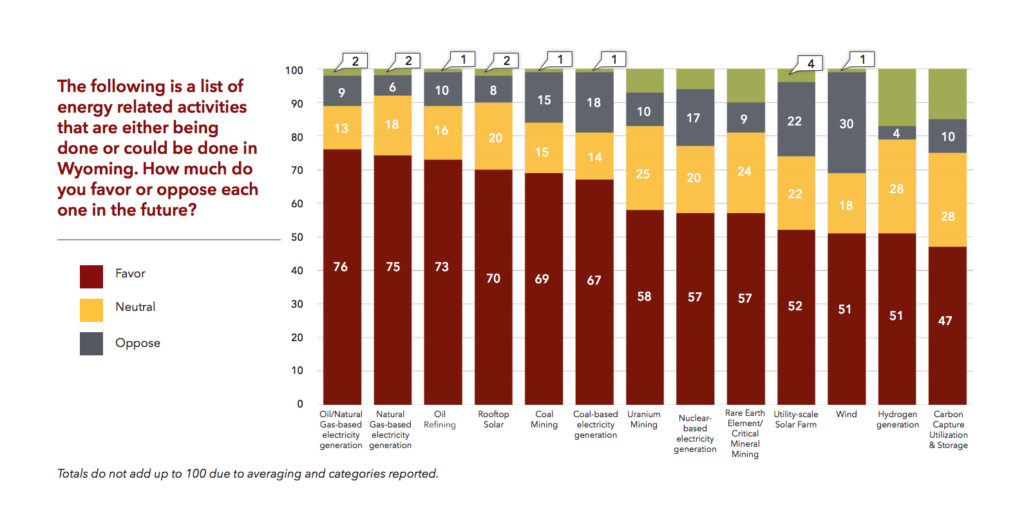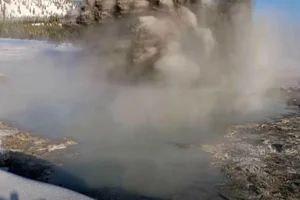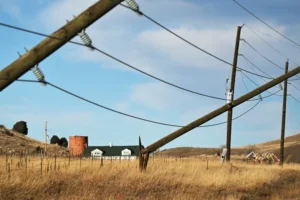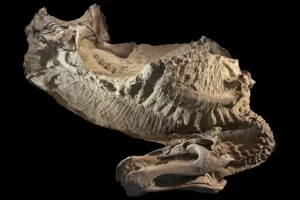UW Study Reveals Strong Support for Fossil Fuels, Increasing Embrace of Other Energy Sources
Some survey respondents seek a ‘more market-driven approach’ for energy industry
- Published In: Other News & Features
- Last Updated: Oct 02, 2023

By Shen Wu Tan
Special to the Wyoming Truth
Although fossil fuels have faced some scrutiny and opposition, Wyomingites prefer these traditional sources of energy over newer technologies and renewable energy types, new analysis from the University of Wyoming reveals.
The analysis, published last month, found that 76% of respondents favor oil and natural gas-based electricity generation, 73% favor oil refining and 70% favor rooftop solar. Coal also made the top of the list with 69% in support of coal mining and 67% in support of coal-based electricity generation. Uranium mining followed coal with approval from 58% of survey respondents, while 57% expressed support for nuclear-based electricity generation.
Utility scale solar and wind received the least amount of support at 22% and 30% respectively. Many survey participants also were neutral or uncertain about emerging energy types such as hydrogen, rare earth elements and carbon capture, utilization and storage (CCUS).
“Wyoming has an old and strong relationship with oil, gas and coal, and prides itself on being a leader in energy delivery to the country,” Jessica Western, an adjunct professor for the university’s Haub School of Environment and Natural Resources who led the study, told the Wyoming Truth. “Generations of Wyoming families and communities are built on this work. This level of pride was very evident in the qualitative data…. However, as the demand from other states increases for decarbonized electrons, our interviewees were deliberating how to use fossil fuels to help the state and the country while a transition takes place to different energy types and also remaining a leader in energy.”
Researchers successfully surveyed 357 Wyoming residents last fall to gather their opinions about energy-related activities and their hopes for the state’s energy industry in the future. From there, they conducted a “Q-study” and interviewed 22 Wyomingites who actively work on local energy-related issues at the end of last year and in early 2023. Researchers completed a similar energy study in 2019 and published their findings in 2020.
Survey results indicated support for coal and oil increased from 2019 to 2022, while support for natural gas remained the same. Also, support for nuclear energy and CCUS grew, but support for solar stayed the same.
“These results are a valuable way for us to understand public opinion about energy development in Wyoming, which is vital for all energy industries to move forward,” said Selena Gerace, an associate research scientist, who contributed to the study along with Will Benkelman, a graduate research assistant. “They show that Wyoming residents’ understanding about energy issues has clearly increased, and they are asking important questions about how changes in existing industries and development of new industries will impact Wyoming’s economy, communities and landscapes.”
The study found the majority of respondents believe climate change is happening, but there was a lack of consensus about whether or not the phenomenon is primarily man-made. Over 50% of survey participants said they don’t believe climate change is caused by people, while less than 40% think it is.
But among Q-study participants, the majority believe people are mostly responsible for climate change although some indicated they didn’t think this is the case. Yet, Q-study respondents replied that they believe human activity was at least partially responsible for climate change.
The Wyoming Outdoor Council, the Wyoming Energy Consultants and the Wyoming Energy Authority were unable to provide comments for this story.
Study participants indicated they would like to see more energy planning and policy development on a state level and to be involved in the decision-making process. Respondents expressed a desire to prioritize landscapes, wildlife and economic factors when making decisions about the energy industry. Regarding the Legislature, some participants suggested that lawmakers offer incentives for new companies to utilize emerging technologies in the field.

In the last three years, Wyoming officials have taken some actions on energy issues and policies. The Wyoming Energy Authority created a statewide “all-of-the-above” energy strategy, and Gov. Mark Gordon set a goal for the state to achieve net-zero carbon emissions, according to the study. Wyoming also has obtained priority for permitting Class VI injection wells for permanently storing carbon dioxide.
Western acknowledged Gordon and lawmakers have supported Wyoming’s energy industry in many ways. Yet, she noted study interviewees expressed a desire for a “more market-driven approach” in providing energy, as well as changes in tax structures and incentives to attract more innovation and business.













